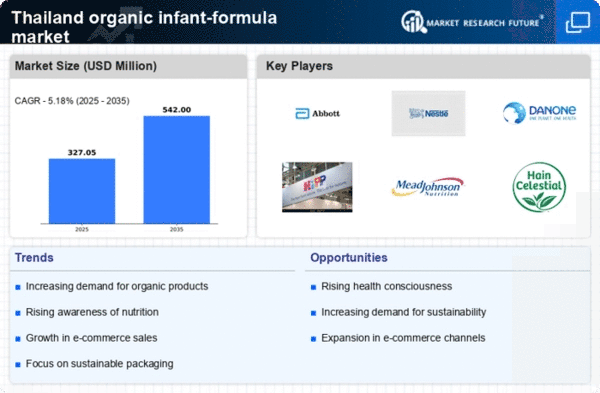The organic infant-formula market in Thailand is characterized by a dynamic competitive landscape, driven by increasing consumer awareness regarding health and nutrition. Major players such as Abbott Laboratories (US), Nestle S.A. (CH), and Danone S.A. (FR) are actively shaping the market through strategic initiatives focused on innovation and sustainability. Abbott Laboratories (US) emphasizes product development that aligns with organic standards, while Nestle S.A. (CH) leverages its extensive distribution network to enhance market penetration. Danone S.A. (FR) is particularly focused on expanding its organic product lines, which collectively intensifies competition and fosters a culture of continuous improvement among these key players.
In terms of business tactics, companies are increasingly localizing manufacturing to reduce costs and enhance supply chain efficiency. The market structure appears moderately fragmented, with several players vying for market share. This fragmentation allows for niche brands to emerge, yet the collective influence of established companies remains substantial, as they set benchmarks for quality and innovation that smaller entities strive to meet.
In October 2025, Abbott Laboratories (US) announced a partnership with a local Thai organic farm to source ingredients directly, enhancing the traceability and quality of its products. This strategic move not only strengthens Abbott's supply chain but also aligns with growing consumer demand for transparency in food sourcing. Such initiatives are likely to bolster brand loyalty and trust among health-conscious parents.
In September 2025, Nestle S.A. (CH) launched a new line of organic infant formulas specifically tailored to the Thai market, incorporating local flavors and nutritional needs. This localized approach is indicative of Nestle's strategy to resonate with regional preferences, thereby enhancing its competitive edge. By adapting its offerings, Nestle positions itself as a responsive and consumer-centric brand in a rapidly evolving market.
In August 2025, Danone S.A. (FR) expanded its distribution channels by collaborating with e-commerce platforms, facilitating greater accessibility to its organic products. This move reflects a broader trend towards digital transformation within the industry, as companies recognize the importance of online sales channels in reaching tech-savvy parents. Danone's initiative may serve to increase its market share and improve customer engagement through enhanced convenience.
As of November 2025, the competitive trends in the organic infant-formula market are increasingly defined by digitalization, sustainability, and the integration of advanced technologies. Strategic alliances are becoming more prevalent, as companies seek to leverage each other's strengths to enhance product offerings and market reach. The shift from price-based competition to a focus on innovation, technology, and supply chain reliability is evident, suggesting that future differentiation will hinge on the ability to deliver high-quality, sustainable products that meet the evolving demands of consumers.




















Leave a Comment